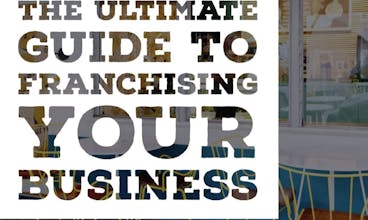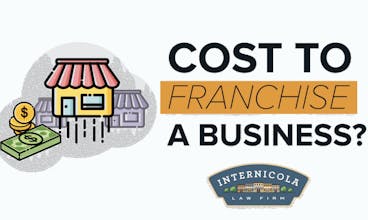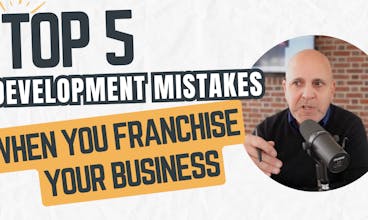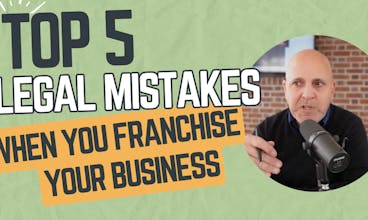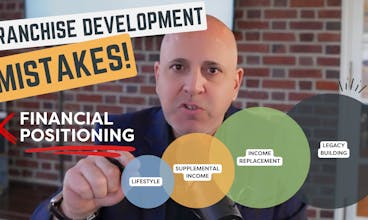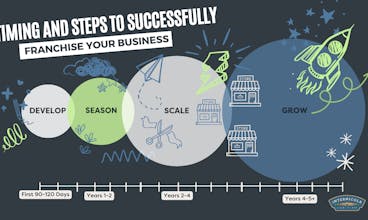If you have questions about franchising and whether or not you should franchise your business then chances are your business is successful and right now you are evaluating options for expansion. Determining whether or not you should franchise your business requires an evaluation of your business, brand, systems, and your own personal goals.
Follow these steps to determine if you should franchise your business:
- Step 1: Understand What Franchising is About
- Step 2: Evaluate Your Personal Goals
- Step 3: Evaluate Your Business Goals
- Step 4: Determine if Your Business is Ready for Franchising
- Step 5: Evaluate Your Strengths and Weaknesses
- Step 6: Understand the Cost to Franchise Your Business
Step 1: Understand What Franchising is About
Franchising is a business model where you take what has worked for you – your business name, brand, know-how, and systems for operating your business – and teach someone else how to duplicate your business and, hopefully, your success. Naturally, there’s more involved; but generally, that’s all franchising is. It’s a business model where you, as the “franchisor,” allow someone else, as the “franchisee,” to copy your business model and duplicate your business at a new business location.
In legal terms, the agreement that creates this relationship is called a franchise agreement and under the federal and state franchise laws you must provide your potential franchisees with a prospectus called a Franchise Disclosure Document or FDD. Your FDD must be disclosed to your prospective franchisees not less than 14 days before you are paid any money by a franchisee or a franchise agreement is signed. Your FDD must also be registered and filed with the franchise registration states.
So, franchising is a business model designed to allow you to achieve multi-unit growth and expansion of your business. As a franchisor, you will train franchisees and provide them with the business systems and ongoing support to enable them to duplicate your business model and, hopefully, your success. In turn, franchisees who are buying a franchise use their own capital, managerial skills, and efforts to open their own franchised business and expand your brand.
When you become a franchisor and franchise your business, you’re entering into an entirely new business – the business of selling franchises, training and supporting franchisees, and managing the growth of your brand. No longer are you just the owner and operator of your business – you’re a franchisor!
Franchising isn’t a get-rich-quick opportunity and it’s not a way to quickly generate extra cash. Just because someone is willing to pay you to duplicate and franchise your business doesn’t mean that you should accept. You should only franchise if it is a part of your long-term growth strategy and goals. Only franchise if your goal is to expand your brand and to build an organization to support and assist your future franchisees.
Step 2: Evaluate Your Personal Goals
Now that you understand what franchising is all about (Step 1), evaluate your personal goals and determine whether or not they align with franchising.
Can you envision yourself on a path where, over time, you:
- Take the time to learn franchising?
- Invest in marketing, promoting, and selling franchises?
- Invest in building support systems and infrastructure to train and support franchisees who, in turn, will help you grow your brand?
- Attend franchise trade shows, networking events, and education events to help you better understand the franchising world and promote your brand?
- Run an entirely new business and organization that goes far beyond the original business that got you here?
If your answer is “yes” to all these questions, then it’s safe to say that your personal goals are aligned with franchising. If you have answered “no” to any of these questions and you are still interested in franchising, then you need to take a step back right now and have a more detailed conversation about whether franchising will be right for you.
Step 3: Evaluate Your Business Goals
The most common way to grow a business is doing exactly what probably got you here – organic growth and expansion. However, many times organic expansion is limited and slow. Whether it’s limited capital to fuel growth, or a management team that just can’t take on more tasks, more often than not, franchising is the solution. Franchising allows you to take what has worked for your business and train and recruit franchisees who will use their capital and managerial efforts to expand your brand into new markets.
So, to evaluate your business goals and determine whether or not they align with franchising, answer the following questions: Do your business goals include:
- Growing the reach of your brand?
- Entering into new markets across the country?
- Building systems to support and train franchisees?
- Partnering with franchisees who will become a part of your brand?
- Building an organization that, over time, will become bigger than you and your current management team?
The answers to these questions may seem simple. Who wouldn’t want to grow their business? But, these questions go much deeper than just growing and making more money. If you are going to franchise, your business goals need to also be about creating win-win relationships for you and your future franchisees. Once you franchise, your business is no longer only about you and your team: it becomes much bigger.
Step 4: Determine if Your Business is Ready for Franchising
Evaluate these five factors to determine if your business is ready for franchising:
a. Is Your Business Successful?
Franchising is all about success and taking the business, brand, systems, and know-how that have allowed you to make your business a success and duplicating these systems for your franchisee partners. Your business must be successful and must have a track record of results.
b. Is Your Business Scalable?
Can your business model be successfully duplicated by franchisees? If it can, then your business is scalable. Scalability questions to consider include:
- Can you train franchisees to successfully deliver the same products or services that have made your business a success?
- Can you develop systems to support franchisees and ensure that they maintain consistent levels of quality and customer service?
- Can you support franchisees by delivering the necessary products (for example, ingredients and branded packaging for food service businesses) and support systems (for example, customer relationship management systems and call centers for service-based businesses) for their day-to-day operations
- Are you willing to spend the time and, as your system grows, build a team to support your franchisees and improve your business systems?
- Will your franchisees be profitable if they follow your systems and business model?
c. Is Your Brand Protectable?
As a franchisor, one of the primary assets that you will be licensing and conveying to your franchisees is your brand. So, your brand needs to be protected and secure. To protect your brand, you need to own and control your business and trade name - at the most basic level, (a) register your trademark (i.e., your brand name) with the United States Patent and Trademark Office (USPTO) and (b) control the website url domain name for your brand (i.e., www.yourbrand.com). Brand protection questions to consider:
- Is your business trade name registered with the USPTO? If it is not, is it capable of obtaining USPTO registration in the future?
- Do you control the url website address for your brand name?
- Are there competitors who use an almost identical brand name, i.e., your brand name is somewhat generic?
d. Are you Committed to Building a Franchise System?The most successful franchise systems are not the ones with the best ideas, products, or services; they are the ones with the best execution and commitment to building a franchise system. Whether your franchise management team will start off as a team of one (just you) or a team of four, franchise success and the franchisability of your business have a lot to do with your commitment to building a franchise system. Commitment questions to consider:
Brand protection questions to consider:
- Are you ready to commit to a 1-, 2- and 5-year plan focused on consistently building out a franchise system that will grow over time and not overnight?
- Are you of the mindset that franchise success has much more to do with consistent execution and focus, rather than just really big ideas?
- Are you approaching franchising as a natural outgrowth of the success of your business and your desire to expand and grow your brand?
e. Do you Have the Right Budget?
Launching a franchise is like launching any new business, and new businesses require the right budget and capital to grow. Shortcuts are not the answer. Before franchising your business, you need to understand what your franchise goals are, how quickly you want to achieve them, and the right budget necessary to get you to your goals. Remember, launching your franchise system is not the finish line - it is just the start. Budget questions to consider:
- What is the cost to launch a franchise system that includes an FDD and franchise infrastructure that is unique to your business and your franchise system and designed to achieve real growth?
- What is the cost to protect your trademarks and brand?
- What is the cost to register your FDD in the franchise registration states that you are targeting?
- After you launch your franchise, what are the ongoing legal costs to maintain your FDD and registrations?
- After you launch your franchise, what are the costs that will be incurred in promoting and marketing your franchise system and selling franchises?
Step 5: Evaluate the Strengths and Weaknesses of Your Business
As a model for business expansion, franchising is proven and works. Consider that franchising has created wealth throughout almost every industry, whether involving service-based businesses, retail-based businesses, wholesalers, or even non-traditional business models like healthcare, cannabis, and medical spas.
Evaluate the strengths and weaknesses of your business within your own industry, including:
- Your Focus as a Founder - Smart franchise leaders have proven that being a dedicated and committed founder is the most important success factor when it comes to franchising your business. When a franchise grows and achieves great results, there are many who claim credit – franchise consultants, developers, lawyers, sales teams, etc. When a franchise system fails, no one takes credit and everyone blames the founder. The reality is that franchise success will, ultimately, be driven by you. You’re the founder and leader of the business that you are now franchising and, while a great franchise lawyer and team will provide you with the tools to succeed, success must be driven from the top and requires an unwavering commitment by you to not only franchise your business, but to also build and grow a winning franchise system.
- Brand Differentiators - If you are thinking about franchising your business, there needs to be something special about what you do, what you offer, how you do it, or the results you achieve. Although the products or services sold by your business may be similar or identical to your competitors, there still needs to be something special about your business.
- Your Industry - In the beginning, when you start selling franchises, your success will be influenced by the industry and market segment that your business operates in. If your business operates in a new and hot industry or segment that is not crowded in the franchise space, then franchise sales and growth will, most likely, be easier and less expensive than more traditional businesses that are already well-represented in the franchise industry. This doesn’t mean that you shouldn’t franchise your business if you operate within a traditional market segment; it just means you may have to work harder. There are many examples of traditional and crowded market segments being redefined by new franchisors. A great example is Five Guys. They redefined a burger segment that, by all accounts, seemed crowded and closed.
Step 6: Understand the Cost to Franchise Your Business
No matter the business or industry, without the right capital and investments, you can’t win. The same is true for franchising. Far too many emerging brands enter the franchise world without properly budgeting. Many times, they spend all of their money on the franchising process: preparing their operations manual, Franchise Disclosure Document, franchise sales process, etc., without budgeting for franchise sales, marketing, and promoting their franchise brand over the next 3, 6, 12, and 24 months.
So, before you decide to franchise your business, evaluate the costs of not only “franchising your business,” but also the money that you need to spend over the next 12 and 24 months to market and promote your franchise. To gain a better understanding about the cost to franchise, read How Much Does It Cost to Franchise My Business.
Make sure that you have the right capital to succeed. While there are no shortcuts, working with the right team can save you tens of thousands of dollars.
Conclusion
Ultimately determining whether or not you should franchise your business comes down to whether or not your business is ready to franchise and whether or not franchising fits into your growth goals over the next 5 years and beyond.
